TOPICS OF THE DAY.
MR- GLADSTONE.
A REPORT has reached us that Mr. Gladstone intends to give his support to Mr. Mihier Gibson's resolutions in the House of Com- mons on Monday. The resolutions affirm that the last proposi- tions of Russia afford ground for further negotiation with a view to the conclusion of peace • ; in other words, Mr. Milner Gibson presents to the British House of Commons, only in a more positive form, the opinion thrown out by the Austrian Minister Count Buol, and almost disavowed by him in the same breath. This view Mr. Gladstone, it is understood, intends to advocate. We have not denied that much might be said for it from the Aus- trian point of view : Mr. Gladstone, it seems, thinks that some- thing is to be said for it from the English point of view ; and any- thing which he undertakes to say must be worth hearing and considering. We take it for granted that he has surveyed the difficulties in- herent in the position which he accepts. Probably he will be able to show us reasons for supposing that peace is possible at a price which is not prohibitory. At present we see no sign that it will be granted to us, even if we wish it. Russia shows no symptom of yielding. England could hardly draw back at this stage, stultify all her importunities to Austria, and betray France. Mr. Glad- stone may be in possession of data for showing that whatever na- tional honour or national interest may dictate, this country has not the means of fulfilling its military engagements ; that it is physically impracticable to go on ; and that, submitting to irre- sistible necessity, we must take that course which, on mere sus- picion, we have accused Austria of contemplating. It will not do to say that we only suggest this course to our faithful ally; because, for England to suggest a capitulation in the midst of contest, is to do half the work of surrendering, leaving but half a choice if any to our ally. Austria, Prussia, and Germany, must be confirmed in their paralysis by such a proposition ema- nating from the British Representative Chamber; and France, taught how fickle is the faith of England, must perforce go off on some other course of her own, which we could have little claim to influence or modify. Of course Mr. Gladstone has considered these responsibilities involved in the initiative which he is taking ; for his junction with a small political sect constitutes a new initiative of his own. But there is something to be answerable for beyond the initiative. Powerful indeed must be the reasons, strong the pressure of moral duty, which can permit a statesman to advance such a proposition at all unless he has at least a fair prospect of carrying it ; and we presume that Mr. Gladstone has well weighed also the responsibilities,of raising a cry of capitulation in the face of the enemy, before ascertaining whether the rest of our camp, or even a majority, is willing to agree. Because the very sound, we say, has a compulsion in it. Mr. Gladstone is a man of conscience and foresight, and we await his reasons ; although it is difficult for people of less casuistical power even to conjecture what reasons can be invented.
There are some further moral consequences which, we presume, Mr. Gladstone has equally considered, in order to a satisfactory explanation. It will naturally be said, on this new revelation of Mr. Gladstone's inmost conviction, or sentiment, that the reproach- ful suspicions excited against him in office were just, and that as Chancellor of the Exchequer he impeded rather than facilitated the supply of resources—that he "starved the war." It is difficult to suppose that the reasons for returning to the status quo differ from the reasons against going to war at all : we are anxious to know how it happened, then, that Mr. Gladstone accepted the moral responsibility of the war. Thinking as we must understand him to think on such a subject, at least until we have his explanation, how was it he departed from the established and wholesome rule, that no man should remain in office under the Crown who cannot in his conscience approve of the general principles of the Cabinet on the most important points P The example of a man like Mr. Gladstone is a serious matter. To infringe a political principle of such mo- ment, depending so entirely on moral acceptance and faithful re- cognition by successive Ministers, is in fact an inroad upon our constitution which may be alarming. And the practical conse- quences, in the present case, wear the darkest aspect. If this war ought not to have been undertaken, who could have done so much to prevent it as Mr. Gladstone, by the moral example of his retiring from office rather than undertake it—by the arguments which none know so well how to marshal P That would have brought it to an issue. But he assisted to initiate the war that he ought to have prevented ; and we scarcely expect to hear as his justification that he tried to make the war as little as possible, by starving it. If we return to the status quo, our liabilities incurred, the outlay of blood, will have been wasted ; and Mr. Gladstone might have pre- vented all that amount of calamity by speaking out ! If it is true that really we ought not, because we cannot, per- severe with the war—because the country cannot produce states- men equal to the historical greatness of their country, or to the soldiers of their own day—or because the people is too far sunk in "torpor "to sustain a contest—we must, as we have before said, take an humbler place in Europe ; and Mr. Gladstone, if the report is correct, seems to undertake the responsibility of letting his voice be
$ The precise terms of the notice are—" That the propositions made by the Government of Russia, for giving effect to the principle of the said Third Article, contain elements for renewed negotiation, and may offer the means of obtaining an honourable and satisfactory peace."
the one immortalized in history as first giving articulate utterance to the necessity. But if we take an humbler place abroad, we accept an humbler condition at home. It is not only that in prospect we place the whole country, in vocation and aspiration, beneath a sectional minority of Manchester; but the step ascribed to Mr. Gladstone offers the opportunity for new and disastrous com- binations—for coalitions between the Manchester embryo and the remains of an old Tory party whose sympathy with the enemy, as a power upholding despotic principles abroad and subserv- mg party purposes here, is scarcely concealed. Like many a missionary, Mr. Gladstone will probably find himself surrounded by all the traitors and recreants, as well as the fanatics, who hope to make a market out of his defection ; and his suc- cess would lift him on the shoulders as leader of so monstrous a coalition, that the mere junction of the men at such a moment would disgrace the Parliament in which they could prevail and the country represented by that Parliament. In view of these contingencies, we are curious indeed to learn the reasons that can have justified Mr. Gladstone even in letting it be supposed that he contemplated the assumption of such responsibilities.



























 Previous page
Previous page